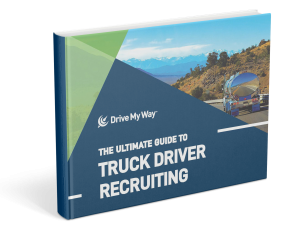
Each May, organizations across the country recognize Mental Health Awareness Month, shining a spotlight on the importance of emotional well-being.
For the trucking industry, this is a critical time to emphasize the mental health needs of drivers, an issue that is often overlooked, but vital to retention, safety, and the overall health of the workforce.
Keep reading to understand the importance of mental health awareness and to learn some practical tips you can use to display your commitment to the wellbeing of every one of your drivers.
Why Mental Health Awareness Matters in Trucking
Truck driving can be an incredibly rewarding profession, but it also comes with unique mental health challenges.
Long hours on the road, time away from family and friends, irregular sleep schedules, and the high pressure to meet delivery deadlines can take a toll on drivers’ emotional and psychological well-being.
Without support, drivers may experience depression, anxiety, loneliness, burnout, and even substance abuse. According to industry research, truck drivers are more likely to suffer from mental health issues than workers in many other fields, and untreated mental health struggles can increase accident risk, absenteeism, and turnover.
Raising awareness and supporting driver mental health isn’t just the right thing to do, it’s actually good for business. Happier, healthier drivers are more engaged, more productive, and more likely to stay with your company long-term.
How Trucking Companies Can Support Driver Mental Health
Start the Conversation
One of the biggest barriers to mental health support is stigma. It is important to create a culture where drivers feel comfortable talking about stress, anxiety, or depression without fear of judgment.
Leadership can model this openness by sharing mental health resources and emphasizing that seeking help is a sign of strength, not weakness.
Provide Access to Resources
Make sure drivers know where to turn for help. Partner with Employee Assistance Programs (EAPs) that offer counseling, support groups, and mental health resources.
Consider offering access to telehealth services, such as BetterHelp, so drivers can connect with mental health professionals even while on the road.
Offer Mental Health Training for Staff
Equip dispatchers, managers, and supervisors with basic mental health awareness training.
Teaching your team how to recognize signs of emotional distress and respond with empathy can create a safer, more supportive environment for everyone. Including every employee in training also helps reduce stigma and highlights your commitment to company-wide support.
Encourage Healthy Schedules and Habits
Support drivers by promoting schedules that allow for adequate rest and meaningful time at home. Avoid setting unrealistic delivery deadlines that push drivers beyond their limits, increasing stress and fatigue.
In addition to thoughtful scheduling, encourage drivers to prioritize their physical health, which plays a crucial role in mental well-being. Share resources and tips on healthy eating, staying active on the road, and managing stress effectively. Small, consistent habits can make a big difference in a driver’s overall quality of life.
Recognize the Signs
Stay alert to common signs of mental health struggles among drivers, such as changes in mood, withdrawal from communication, irritability, or noticeable drops in performance.
Early intervention is key, paying attention to even small changes can have a big impact. If a driver has close relationships with mentors, dispatchers, or coworkers, these individuals can also provide valuable insight and help identify when a driver might need extra support.
Celebrate Mental Health Awareness Month
Each, considering using May as an opportunity to roll out new initiatives, share educational materials, and start open conversations.
Even small gestures, such as sending out a supportive newsletter or providing a mental health-themed safety meeting, can show drivers that their mental health matters.
While Mental Health Awareness Month is an important reminder, supporting mental health should be a year-round commitment.
Prioritizing drivers’ mental well-being leads to a safer, more resilient fleet, and it shows drivers that they are valued not just as employees, but as people.








